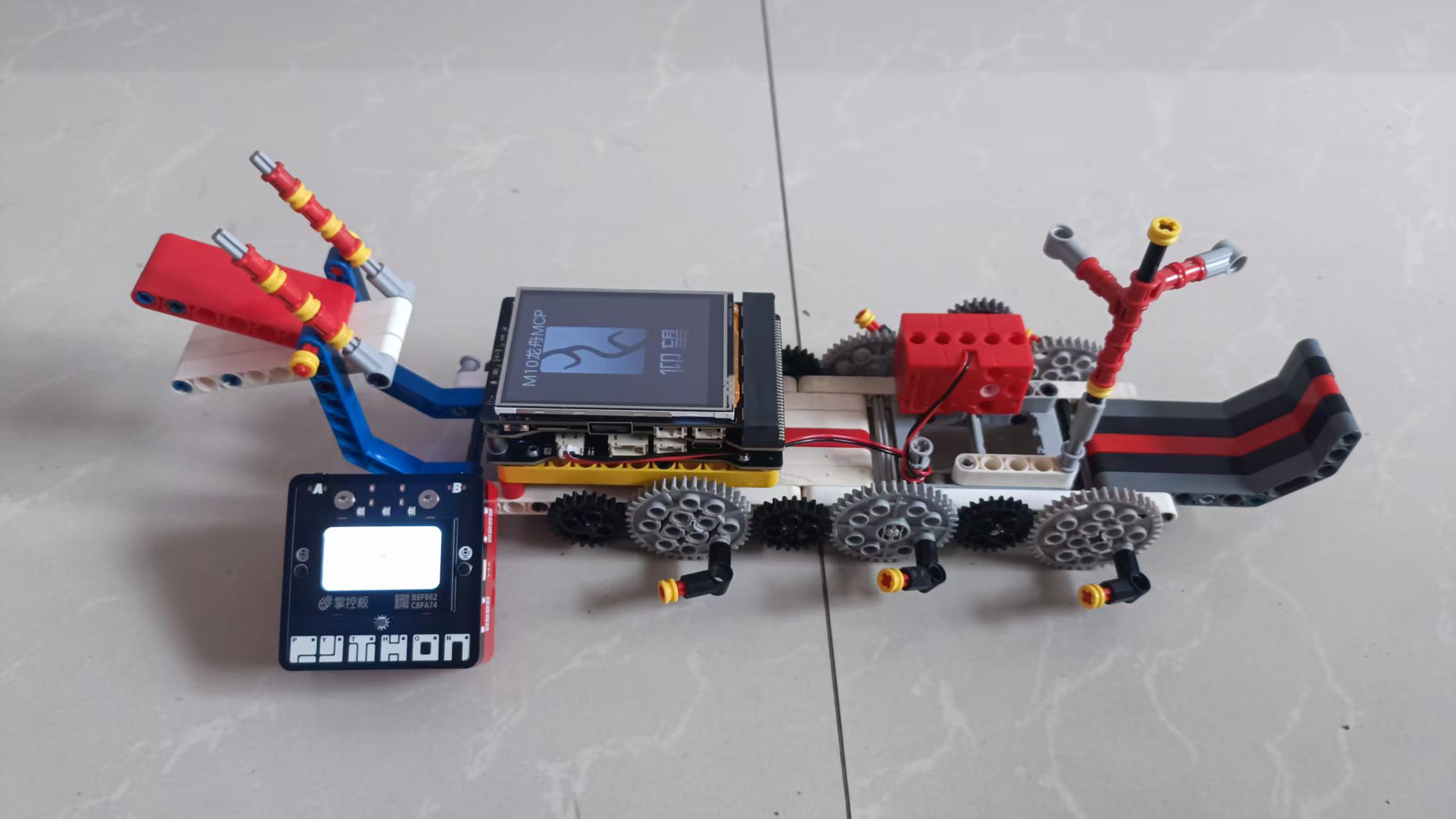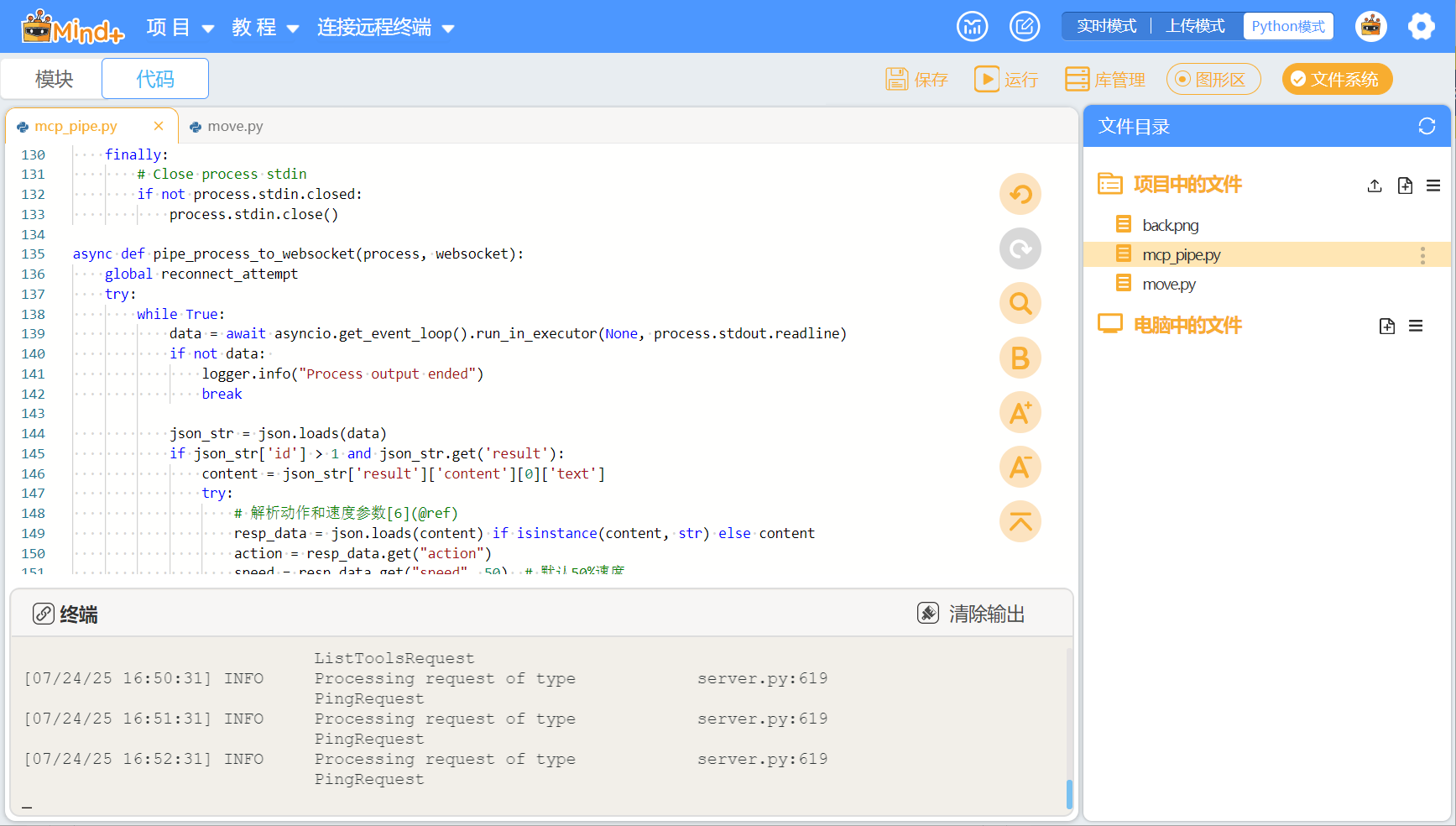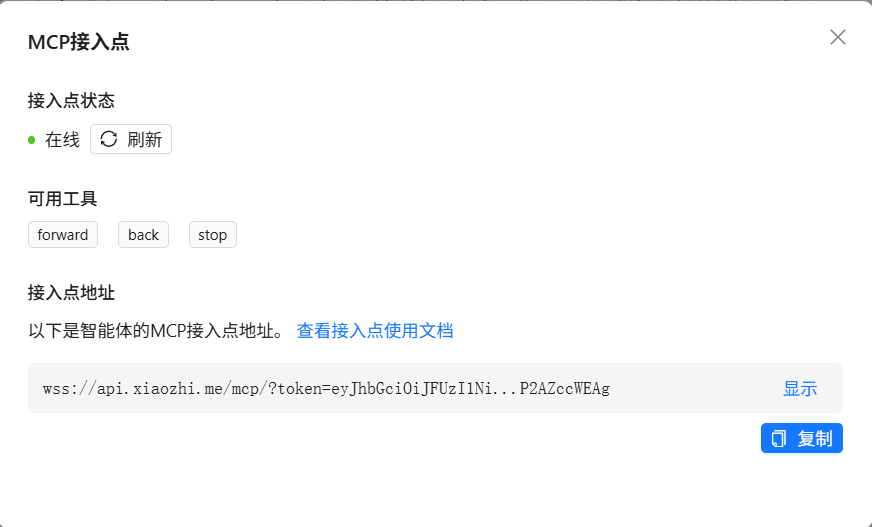7.24
【写在前面】
当参加DF的活动,M10电机扩展板组合发到我手中时,是在端午节时,对它的了解从它和龙舟模型的相遇开始,兜兜转转,又回到了龙舟,从简单的项目,一点点增加难度,由于扩展板的出现和活动的号召,我对M10这块板子增加了认识,M10功能很强大,朋友们用它做出了很多高大上的项目,而小白如我,一直在低水平徘徊,不过也在变化,跟着大家的脚步,有了那么一点点提高。
小智和龙舟结合,它只有一个电机,简单把前面代码改改,就可以控制它了,非常简单。

材料清单
- M10+电池扩展板 X1
- 龙舟模型 X1
- 乐动小智 X1
步骤1 行空板M10上安装pyenv环境和Python 3.12.7及MCP库安装
步骤2 小智聊天机器人配置及获取MCP接入点地址
步骤3 编写M10程序
系统包含两个核心模块:通信管道模块(mcp_pipe.py) 和 动作服务模块(move.py)。
先贴上来的是改写的代码,它们可以控制龙舟前进,后退,停止。
在Mind+中运行mcp_pipe.py。

当终端如上图,小智MCP服务连接成功。
此时,小智控制台接入点状态:在线,可用工具:可见。

下面放的是我修改所得的两个文件。
# move.py
from mcp.server.fastmcp import FastMCP
import sys
import logging
logger = logging.getLogger('MoveServer')
# 修复Windows控制台UTF-8编码问题
if sys.platform == 'win32':
sys.stderr.reconfigure(encoding='utf-8')
sys.stdout.reconfigure(encoding='utf-8')
# 创建MCP服务器
mcp = FastMCP("MoveServer")
@mcp.tool()
def forward() -> dict:
"""
控制龙舟前进。
该函数将设置P5和P6引脚为低电平,P8和P16引脚为50%占空比的PWM输出,使龙舟前进。
Returns:
dict: 返回一个字典,包含操作结果。
"""
result = "龙舟前进"
logger.info(result)
return {"success": True, "result": result}
@mcp.tool()
def back() -> dict:
"""
控制龙舟后退。
该函数将设置P5和P6引脚为高电平,P8和P16引脚为50%占空比的PWM输出,使龙舟后退。
Returns:
dict: 返回一个字典,包含操作结果。
"""
result = "龙舟后退"
logger.info(result)
return {"success": True, "result": result}
@mcp.tool()
def stop() -> dict:
"""
控制龙舟停止。
该函数将设置P8和P16引脚的PWM输出为0,使龙舟停止。
Returns:
dict: 返回一个字典,包含操作结果。
"""
result = "龙舟停止"
logger.info(result)
return {"success": True, "result": result}
# 启动服务器
if __name__ == "__main__":
mcp.run(transport="stdio")
"""
This script is used to connect to the MCP server and pipe the input and output to the websocket endpoint.
Version: 0.1.0
Usage:
export MCP_ENDPOINT=
python mcp_pipe.py
"""
# -*- coding: UTF-8 -*-
# MindPlus
# Python
from unihiker import GUI
import asyncio
import websockets
import subprocess
import logging
import os
import signal
import sys
import random
from dotenv import load_dotenv
from pinpong.board import Pin
from pinpong.board import Board
from pinpong.board import Board,Pin
#from pinpong.extension.unihiker import *
import json
Board().begin()
u_gui=GUI()
p_p5_out=Pin(Pin.P5, Pin.OUT)
p_p8_pwm=Pin(Pin.P8, Pin.PWM)
p_p6_out=Pin(Pin.P6, Pin.OUT)
p_p16_pwm=Pin(Pin.P16, Pin.PWM)
u_gui.draw_image(image="back.png",x=0,y=0)
u_gui.draw_text(text="M10龙舟MCP",x=30,y=10,font_size=25, color="#FFFFFF")
# 设置日志记录器
# Load environment variables from .env file
#load_dotenv()
# Configure logging
logging.basicConfig(
level=logging.INFO,
format='%(asctime)s - %(name)s - %(levelname)s - %(message)s'
)
logger = logging.getLogger('MCP_PIPE')
# Reconnection settings
INITIAL_BACKOFF = 1 # Initial wait time in seconds
MAX_BACKOFF = 600 # Maximum wait time in seconds
reconnect_attempt = 0
backoff = INITIAL_BACKOFF
async def connect_with_retry(uri):
"""Connect to WebSocket server with retry mechanism"""
global reconnect_attempt, backoff
while True: # Infinite reconnection
try:
if reconnect_attempt > 0:
wait_time = backoff * (1 + random.random() * 0.1) # Add some random jitter
logger.info(f"Waiting {wait_time:.2f} seconds before reconnection attempt {reconnect_attempt}...")
await asyncio.sleep(wait_time)
# Attempt to connect
await connect_to_server(uri)
except Exception as e:
reconnect_attempt += 1
logger.warning(f"Connection closed (attempt: {reconnect_attempt}): {e}")
# Calculate wait time for next reconnection (exponential backoff)
backoff = min(backoff * 2, MAX_BACKOFF)
async def connect_to_server(uri):
"""Connect to WebSocket server and establish bidirectional communication with `mcp_script`"""
global reconnect_attempt, backoff
try:
logger.info(f"Connecting to WebSocket server...")
async with websockets.connect(uri) as websocket:
logger.info(f"Successfully connected to WebSocket server")
# Reset reconnection counter if connection closes normally
reconnect_attempt = 0
backoff = INITIAL_BACKOFF
# Start mcp_script process
process = subprocess.Popen(
['python', mcp_script],
stdin=subprocess.PIPE,
stdout=subprocess.PIPE,
stderr=subprocess.PIPE,
encoding='utf-8',
text=True # Use text mode
)
logger.info(f"Started {mcp_script} process")
# Create two tasks: read from WebSocket and write to process, read from process and write to WebSocket
await asyncio.gather(
pipe_websocket_to_process(websocket, process),
pipe_process_to_websocket(process, websocket),
pipe_process_stderr_to_terminal(process)
)
except websockets.exceptions.ConnectionClosed as e:
logger.error(f"WebSocket connection closed: {e}")
raise # Re-throw exception to trigger reconnection
except Exception as e:
logger.error(f"Connection error: {e}")
raise # Re-throw exception
finally:
# Ensure the child process is properly terminated
if 'process' in locals():
logger.info(f"Terminating {mcp_script} process")
try:
process.terminate()
process.wait(timeout=5)
except subprocess.TimeoutExpired:
process.kill()
logger.info(f"{mcp_script} process terminated")
async def pipe_websocket_to_process(websocket, process):
"""Read data from WebSocket and write to process stdin"""
try:
while True:
# Read message from WebSocket
message = await websocket.recv()
logger.debug(f"<< {message[:120]}...")
# Write to process stdin (in text mode)
if isinstance(message, bytes):
message = message.decode('utf-8')
process.stdin.write(message + '\n')
process.stdin.flush()
except Exception as e:
logger.error(f"Error in WebSocket to process pipe: {e}")
raise # Re-throw exception to trigger reconnection
finally:
# Close process stdin
if not process.stdin.closed:
process.stdin.close()
async def pipe_process_to_websocket(process, websocket):
"""Read data from process stdout and send to WebSocket"""
global p_p5_out,p_p8_pwm,p_p6_out,p_p16_pwm
try:
while True:
# Read data from process stdout
data = await asyncio.get_event_loop().run_in_executor(
None, process.stdout.readline
)
if not data: # If no data, the process may have ended
logger.info("Process has ended output")
break
# Send data to WebSocket
logger.debug(f">> {data[:120]}...")
print(data)
# 解析 JSON 字符串
json_str = json.loads(data)
print(json_str['id'])
if json_str['id']>1:
print(json_str['id'])
if json_str.get('result', {}):
text=json.loads(json_str['result']['content'][0]['text'])
if text['success']:
print(text['result'])
L=480
if "前进" in text['result']:
print("******************************")
p_p5_out.write_digital(0)
p_p8_pwm.write_analog(512)
p_p6_out.write_digital(0)
p_p16_pwm.write_analog(512)
if "后退" in text['result']:
print("******************************")
p_p5_out.write_digital(1)
p_p8_pwm.write_analog(512)
p_p6_out.write_digital(1)
p_p16_pwm.write_analog(512)
if "停止" in text['result']:
print("******************************")
p_p8_pwm.write_analog(0)
p_p16_pwm.write_analog(0)
# In text mode, data is already a string, no need to decode
await websocket.send(data)
except Exception as e:
logger.error(f"Error in process to WebSocket pipe: {e}")
raise # Re-throw exception to trigger reconnection
async def pipe_process_stderr_to_terminal(process):
"""Read data from process stderr and print to terminal"""
try:
while True:
# Read data from process stderr
data = await asyncio.get_event_loop().run_in_executor(
None, process.stderr.readline
)
if not data: # If no data, the process may have ended
logger.info("Process has ended stderr output")
break
# Print stderr data to terminal (in text mode, data is already a string)
sys.stderr.write(data)
sys.stderr.flush()
except Exception as e:
logger.error(f"Error in process stderr pipe: {e}")
raise # Re-throw exception to trigger reconnection
def signal_handler(sig, frame):
"""Handle interrupt signals"""
logger.info("Received interrupt signal, shutting down...")
sys.exit(0)
if __name__ == "__main__":
# Register signal handler
signal.signal(signal.SIGINT, signal_handler)
# mcp_script
#if len(sys.argv) < 2:
# logger.error("Usage: mcp_pipe.py ")
# sys.exit(1)
mcp_script = "move.py"
# Get token from environment variable or command line arguments
#endpoint_url = os.environ.get('MCP_ENDPOINT')
endpoint_url="wss://api.xiaozhi.me/mcp/?token=******"
if not endpoint_url:
logger.error("Please set the `MCP_ENDPOINT` environment variable")
sys.exit(1)
# Start main loop
try:
asyncio.run(connect_with_retry(endpoint_url))
except KeyboardInterrupt:
logger.info("Program interrupted by user")
except Exception as e:
logger.error(f"Program execution error: {e}")不过我改的代码,只能控制前进、后退、停止。
然后把代码抛给了DeepSeek,让它把代码优化一下,同时增加速度控制功能。
看DS思考的过程也是涨知识的,它给出了下面的代码,上面视频运行的就是这组代码。
两个核心模块:通信管道模块(mcp_pipe.py) 和 动作服务模块(move.py)。系统实现了龙舟模型的远程控制功能,具备前进、后退、停止和速度调节能力。
1. 核心控制功能
| 功能 | 说明 | 速度范围 |
|---|---|---|
| 前进 | 龙舟正向运动 | 0-100%(默认50%) |
| 后退 | 龙舟反向运动 | 0-100%(默认50%) |
| 停止 | 紧急停止龙舟 | - |
2. 速度调节
支持0-100%无级调速(每1%为一个调节档位)
速度-PWM自动转换:速度百分比自动转换为硬件PWM值(0-1023)
默认速度:50%(可通过指令参数修改)
from mcp.server.fastmcp import FastMCP
import logging
logger = logging.getLogger('MoveServer')
mcp = FastMCP("MoveServer")
@mcp.tool()
def forward(speed: int = 50) -> dict:
"""控制龙舟前进(可调速)[3](@ref)
Args:
speed: 速度百分比(0-100),默认50%
Returns:
dict: 包含动作类型和实际速度
"""
speed = max(0, min(100, speed)) # 限制速度范围
logger.info(f"前进速度: {speed}%")
return {"success": True, "result": f"龙舟前进 {speed}%", "action": "forward", "speed": speed}
@mcp.tool()
def back(speed: int = 50) -> dict:
"""控制龙舟后退(可调速)
Args:
speed: 速度百分比(0-100)
"""
speed = max(0, min(100, speed))
logger.info(f"后退速度: {speed}%")
return {"success": True, "result": f"龙舟后退 {speed}%", "action": "back", "speed": speed}
@mcp.tool()
def stop() -> dict:
"""立即停止龙舟"""
logger.info("停止指令")
return {"success": True, "result": "龙舟停止", "action": "stop"}
if __name__ == "__main__":
mcp.run(transport="stdio") # 使用标准IO通信[6](@ref)# -*- coding: UTF-8 -*-
from unihiker import GUI
import asyncio
import websockets
import subprocess
import logging
import os
import signal
import sys
import random
import json
from pinpong.board import Board, Pin
# 初始化硬件
Board().begin()
u_gui = GUI()
p_p5_out = Pin(Pin.P5, Pin.OUT)
p_p8_pwm = Pin(Pin.P8, Pin.PWM)
p_p6_out = Pin(Pin.P6, Pin.OUT)
p_p16_pwm = Pin(Pin.P16, Pin.PWM)
# 界面初始化
u_gui.draw_image(image="back.png", x=0, y=0)
u_gui.draw_text(text="M10龙舟MCP", x=30, y=10, font_size=20, color="#FFFFFF")
# 日志配置
logging.basicConfig(
level=logging.INFO,
format='%(asctime)s - %(name)s - %(levelname)s - %(message)s'
)
logger = logging.getLogger('MCP_PIPE')
# 重连设置
INITIAL_BACKOFF, MAX_BACKOFF = 1, 600
reconnect_attempt, backoff = 0, INITIAL_BACKOFF
def set_motor_speed(direction: int, speed: int):
"""统一设置电机速度和方向[3](@ref)
Args:
direction: 0(前进)/1(后退)
speed: 0-100的速度百分比
"""
pwm_value = int(max(0, min(100, speed)) / 100 * 1023) # 速度转PWM值
p_p5_out.write_digital(direction)
p_p6_out.write_digital(direction)
p_p8_pwm.write_analog(pwm_value)
p_p16_pwm.write_analog(pwm_value)
async def connect_with_retry(uri):
"""Connect to WebSocket server with retry mechanism"""
global reconnect_attempt, backoff
while True: # Infinite reconnection
try:
if reconnect_attempt > 0:
wait_time = backoff * (1 + random.random() * 0.1) # Add some random jitter
logger.info(f"Waiting {wait_time:.2f} seconds before reconnection attempt {reconnect_attempt}...")
await asyncio.sleep(wait_time)
# Attempt to connect
await connect_to_server(uri)
except Exception as e:
reconnect_attempt += 1
logger.warning(f"Connection closed (attempt: {reconnect_attempt}): {e}")
# Calculate wait time for next reconnection (exponential backoff)
backoff = min(backoff * 2, MAX_BACKOFF)
async def connect_to_server(uri):
"""Connect to WebSocket server and establish bidirectional communication with `mcp_script`"""
global reconnect_attempt, backoff
try:
logger.info(f"Connecting to WebSocket server...")
async with websockets.connect(uri) as websocket:
logger.info(f"Successfully connected to WebSocket server")
# Reset reconnection counter if connection closes normally
reconnect_attempt = 0
backoff = INITIAL_BACKOFF
# Start mcp_script process
process = subprocess.Popen(
['python', mcp_script],
stdin=subprocess.PIPE,
stdout=subprocess.PIPE,
stderr=subprocess.PIPE,
encoding='utf-8',
text=True # Use text mode
)
logger.info(f"Started {mcp_script} process")
# Create two tasks: read from WebSocket and write to process, read from process and write to WebSocket
await asyncio.gather(
pipe_websocket_to_process(websocket, process),
pipe_process_to_websocket(process, websocket),
pipe_process_stderr_to_terminal(process)
)
except websockets.exceptions.ConnectionClosed as e:
logger.error(f"WebSocket connection closed: {e}")
raise # Re-throw exception to trigger reconnection
except Exception as e:
logger.error(f"Connection error: {e}")
raise # Re-throw exception
finally:
# Ensure the child process is properly terminated
if 'process' in locals():
logger.info(f"Terminating {mcp_script} process")
try:
process.terminate()
process.wait(timeout=5)
except subprocess.TimeoutExpired:
process.kill()
logger.info(f"{mcp_script} process terminated")
async def pipe_websocket_to_process(websocket, process):
"""Read data from WebSocket and write to process stdin"""
try:
while True:
# Read message from WebSocket
message = await websocket.recv()
logger.debug(f"<< {message[:120]}...")
# Write to process stdin (in text mode)
if isinstance(message, bytes):
message = message.decode('utf-8')
process.stdin.write(message + '\n')
process.stdin.flush()
except Exception as e:
logger.error(f"Error in WebSocket to process pipe: {e}")
raise # Re-throw exception to trigger reconnection
finally:
# Close process stdin
if not process.stdin.closed:
process.stdin.close()
async def pipe_process_to_websocket(process, websocket):
global reconnect_attempt
try:
while True:
data = await asyncio.get_event_loop().run_in_executor(None, process.stdout.readline)
if not data:
logger.info("Process output ended")
break
json_str = json.loads(data)
if json_str['id'] > 1 and json_str.get('result'):
content = json_str['result']['content'][0]['text']
try:
# 解析动作和速度参数[6](@ref)
resp_data = json.loads(content) if isinstance(content, str) else content
action = resp_data.get("action")
speed = resp_data.get("speed", 50) # 默认50%速度
# 执行电机控制
if action == "forward":
set_motor_speed(0, speed) # 前进方向
elif action == "back":
set_motor_speed(1, speed) # 后退方向
elif action == "stop":
set_motor_speed(0, 0) # 停止
except Exception as e:
logger.error(f"控制解析失败: {e}")
await websocket.send(data)
except Exception as e:
logger.error(f"Process-to-WebSocket error: {e}")
raise
async def pipe_process_stderr_to_terminal(process):
"""Read data from process stderr and print to terminal"""
try:
while True:
# Read data from process stderr
data = await asyncio.get_event_loop().run_in_executor(
None, process.stderr.readline
)
if not data: # If no data, the process may have ended
logger.info("Process has ended stderr output")
break
# Print stderr data to terminal (in text mode, data is already a string)
sys.stderr.write(data)
sys.stderr.flush()
except Exception as e:
logger.error(f"Error in process stderr pipe: {e}")
raise # Re-throw exception to trigger reconnection
def signal_handler(sig, frame):
"""Handle interrupt signals"""
logger.info("Received interrupt signal, shutting down...")
sys.exit(0)
if __name__ == "__main__":
signal.signal(signal.SIGINT, lambda sig, frame: sys.exit(0))
mcp_script = "move.py"
endpoint_url = "wss://api.xiaozhi.me/mcp/?token=******" # 实际token
try:
asyncio.run(connect_with_retry(endpoint_url))
except KeyboardInterrupt:
logger.info("用户中断程序")

 返回首页
返回首页
 回到顶部
回到顶部


罗罗罗2025.12.02
666